中考英语语法一点通课件——Lesson 14 非谓语动词
文档属性
| 名称 | 中考英语语法一点通课件——Lesson 14 非谓语动词 | 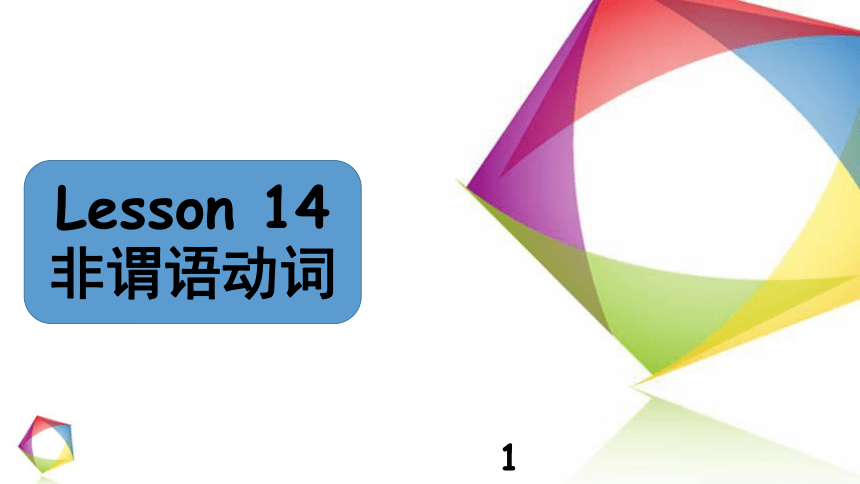 | |
| 格式 | pptx | ||
| 文件大小 | 566.9KB | ||
| 资源类型 | 试卷 | ||
| 版本资源 | 通用版 | ||
| 科目 | 英语 | ||
| 更新时间 | 2022-04-11 14:03:54 | ||
图片预览

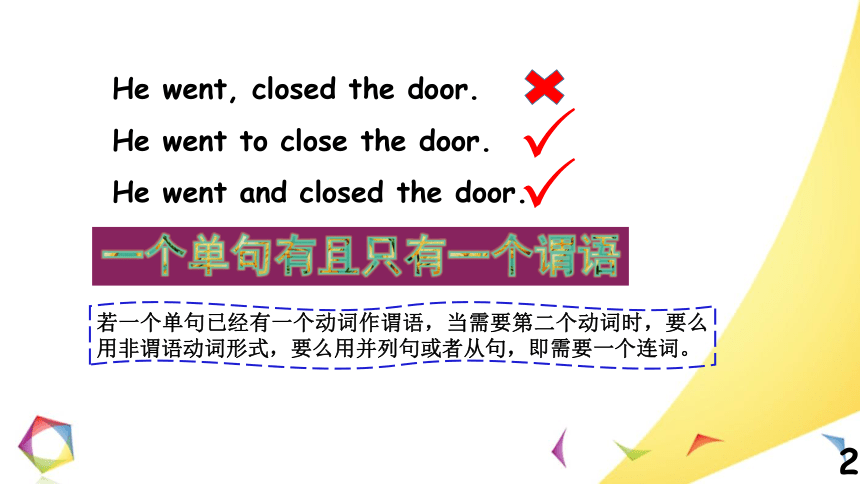

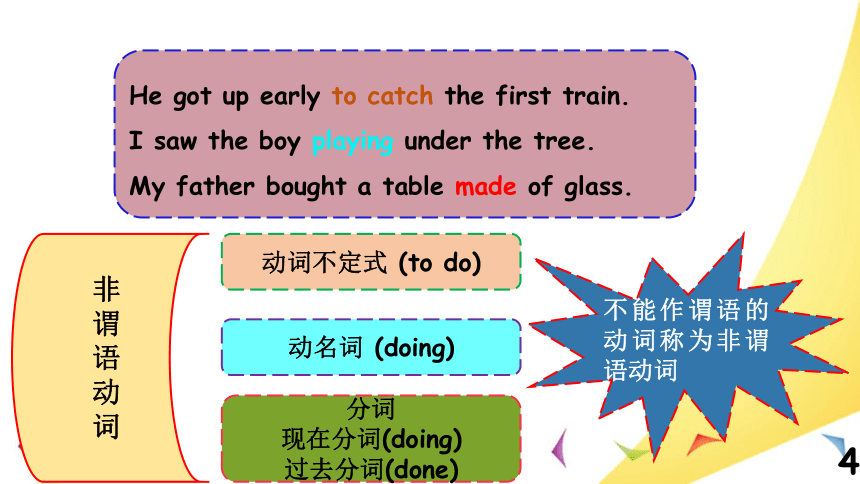
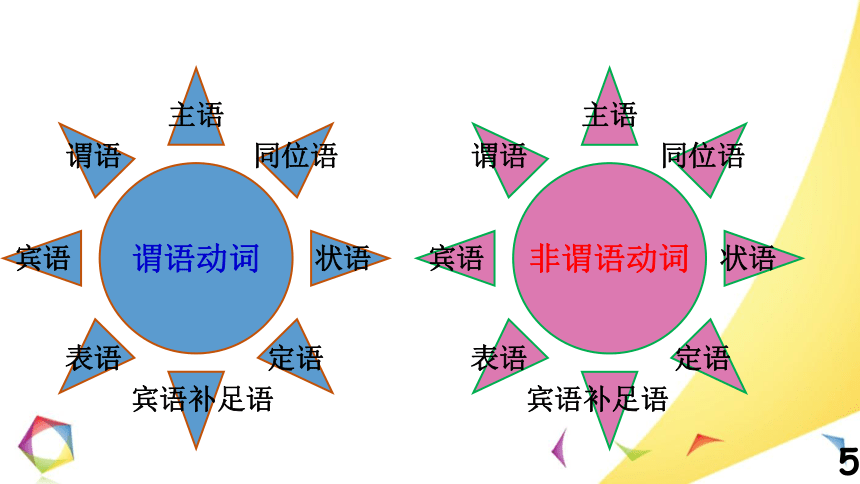



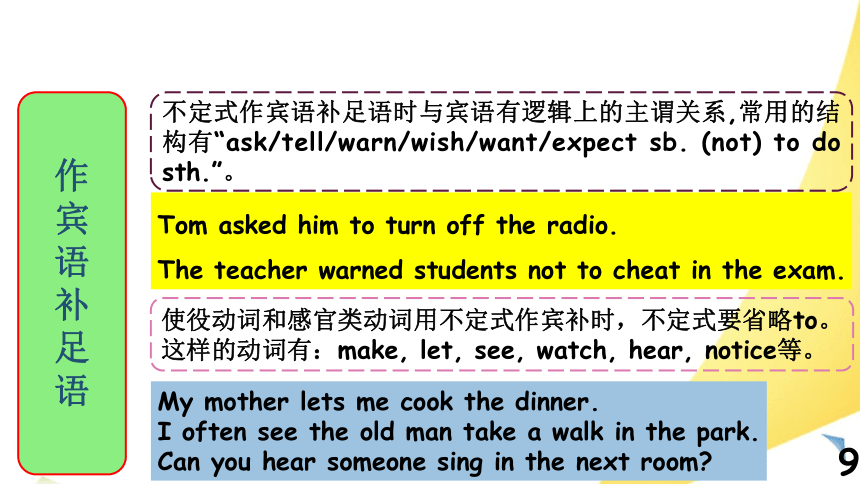
文档简介
(共29张PPT)
Lesson 14非谓语动词He went, closed the door.He went to close the door.He went and closed the door.一个单句有且只有一个谓语若一个单句已经有一个动词作谓语,当需要第二个动词时,要么用非谓语动词形式,要么用并列句或者从句,即需要一个连词。非谓语动词的使用条件一个单句中,已经存在一个谓语动词,又没有连词的情况下,还有别的动词出现时。The teacherssittingtherearefrom other schools.Swimmingin Summer, wecan getcool.Iwanthimto seeyou.一山不能容二虎,除非一公和一母He got up earlyto catchthe first train.I saw the boyplayingunder the tree.My father bought a tablemadeof glass.非谓语动词动词不定式(to do)动名词(doing)分词现在分词(doing)过去分词(done)不能作谓语的动词称为非谓语动词谓语动词主语谓语宾语表语宾语补足语定语状语同位语非谓语动词主语谓语宾语表语宾语补足语定语状语同位语动词不定式(to do)的用法作主语动词不定式作主语时,为了避免头重脚轻,一般用it作形式主语,把真正的主语动词不定式to do置后,常用于“It is +adj./n.+to do sth.”结构中。To learn English well is important.=It is important to learn English well.It is a hard job for her to look after so many kids.当表达“做某事对某人来说是……”的时候,用“It is +adj.+for/of sb. to do sth.”结构,当前面的形容词是表示人的性格或品质时,用介词of;其它形容词用介词for。It is easy for us to get along with him.It is kind of you to help us a lot.作宾语一些谓语动词后只能用不定式作宾语,常见的这类词多表示打算或者希望,如would like, want, wish, hope, decide, plan, expect等。Would you like to see the film tonight He decides to plan for the coming holiday.在动词find, think, feel, believe后跟不定式作宾语时,常用it作形式宾语,而将真正的宾语放在后面,常用的结构为”find/think/feel+it+adj./n.+to do sth.”。He finds it hard to catch up with his classmates.I think it important to sleep early.作表语不定式作表语说明主语的特征和属性。My job is to teach English.Her dream is to become a scientist.Our goal is to win the game.作宾语补足语不定式作宾语补足语时与宾语有逻辑上的主谓关系,常用的结构有“ask/tell/warn/wish/want/expect sb. (not) to do sth.”。Tom asked him to turn off the radio.The teacher warned students not to cheat in the exam.使役动词和感官类动词用不定式作宾补时,不定式要省略to。这样的动词有:make, let, see, watch, hear, notice等。My mother lets me cook the dinner.I often see the old man take a walk in the park.Can you hear someone sing in the next room 作定语不定式作定语时,应放在名词后面,它与名词有逻辑上的动宾关系。如果不定式是不及动词,且与被修饰词之间有动宾关系时,要在不定式后面加上适当的介词。I have a lot of homework to do.There is nothing to worry about.We are looking for a hotel to live in.作状语不定式作状语,表示目的,意为“为了……”,可在不定式前面加上in order或者so as,但是so as to do只能放在句中,in order to do可以放在句首或者句中。I come here to visit my grandparents.He studies hard in order/so as to have a good future.=In order to have a good future, he studies hard.动名词(doing)的用法作主语动名词作主语多表示习惯性动作,谓语动词用单数。Collecting stamps is his hobby.Eating too much is bad for health.Speaking loudly in the reading room is not allowed.作宾语动名词作宾语放在某些动词后边以及介词后面,表示一般的习惯或经常性的动作。常见的这类动词有:finish, enjoy, mind, imagine, spend, keep, practice, allow, advise, suggest, avoid,consider,give up, feel like等。I have finished doing my homework.Do you mind opening the window for us The children feel like drinking some water.What about going swimming in the afternoon 作表语动名词作表语,表示主语的特征和属性。Her job is teaching English.My hobby is lying on the bed and watching TV.作定语动名词作定语表示所修饰名词的用途、作用等。a swimming pool(a pool for swimming)游泳池thereading room(the room for reading)阅览室teaching methods(methods for teaching)教学方法某些动词后边接动词不定式和动名词的区别like to dolike doingVS一次性动作习惯性、经常性的动作I like swimming very much and swimming is my hobby.I don't like to swim this afternoon because I don't feel well.stop to dostop doingVS停下来去做另一件事停止正在做的事情He stopped to have a rest after walking a long way.The students stopped talking when the teacher came in.forget to doforget doingVS忘记要去做某事(未做)忘记做某事(已做)Don’t forget to turn off the light.He forgot locking the door.remember to doremember doingVS记得要去做某事(未做)记得做过某事(已做)Remember to hand in your homework.Don’t you remember seeing the person before try to dotry doingVS设法或努力做某事尝试做某事We must try to be more careful.He is trying opening the door.go on to dogo on doingVS放下手头的事继续做别的事继续做原来的事We got up and went on to have breakfast.He didn’t have a rest and went on working.mean to domean doingVS打算做某事意味着做某事I mean to buy a car, but I have no money.Doing that means wasting time.can't help (to) docan't help doingVS不能帮助做某事禁不住做某事Parents should not help do homework for children.After seeing the film, people can't help laughing.作定语分词短语作定语时,位于被修饰词后面,现在分词和被修饰词之间是主动关系;过去分词和被修饰词之间是被动关系。Do you know the girlstanding under the tree I bought a tablemade of glass.分词的用法作状语分词作状语,可以表示时间、条件、原因、让步、方式等等。They walked around the lake, laughing and singing.Punished by his father, Tom cried.作宾语补足语现在分词作宾语补足语时,常放在感官动词see/watch/hear/notice后面,表示一个动作正在进行。过去分词作宾语补足语时,和宾语之间是逻辑上的动宾关系。I saw him going into the supermarket when I crossed the road.He tried to make himself understood by others.1. Where is my passport I remember______it here.You did not left it here. Remember_____it with you all the time.A. to put; to take B. putting; to takeC. to put; taking D. putting; taking2. Would you mind_____quiet for a moment I’m trying_____a form.A. keeping; to fill out B. keeping; fill outC. to keep; to fill out D. to keep; fill out3. ---Why were you so late for work today ---____ to the office was very slow this morning because of the traffic.A. Driving B. Drives C. Drive D. Drove4. After finishing his homework he went on______a letter to his parents.A. write B. writing C. to write D. wrote沙场大点兵沙场大点兵5. I have a lot of things _____ this weekend.A. do B. did C. doing D. to do6. You’d better _____ upstairs and tell the children____ make so much noise.A. go; not to B. go; don’t C. to go; not to D. to go; don’t7. Would you please _____ drop your shoes on the floor at night A. not to B. not C. don’t D. won’t8. Only_______ English doesn't mean _______the language.A.to learn;to learn B.learning;learningC.learning about;learn D.learning about;learning9. We should often practise _________ English with each other.A.to speak B.spoke C.speak D.speaking10. The story was so funny that we ___________.A.couldn't help laugh B.can't laughC.couldn't help laughing D.couldn't help to laugh
Lesson 14非谓语动词He went, closed the door.He went to close the door.He went and closed the door.一个单句有且只有一个谓语若一个单句已经有一个动词作谓语,当需要第二个动词时,要么用非谓语动词形式,要么用并列句或者从句,即需要一个连词。非谓语动词的使用条件一个单句中,已经存在一个谓语动词,又没有连词的情况下,还有别的动词出现时。The teacherssittingtherearefrom other schools.Swimmingin Summer, wecan getcool.Iwanthimto seeyou.一山不能容二虎,除非一公和一母He got up earlyto catchthe first train.I saw the boyplayingunder the tree.My father bought a tablemadeof glass.非谓语动词动词不定式(to do)动名词(doing)分词现在分词(doing)过去分词(done)不能作谓语的动词称为非谓语动词谓语动词主语谓语宾语表语宾语补足语定语状语同位语非谓语动词主语谓语宾语表语宾语补足语定语状语同位语动词不定式(to do)的用法作主语动词不定式作主语时,为了避免头重脚轻,一般用it作形式主语,把真正的主语动词不定式to do置后,常用于“It is +adj./n.+to do sth.”结构中。To learn English well is important.=It is important to learn English well.It is a hard job for her to look after so many kids.当表达“做某事对某人来说是……”的时候,用“It is +adj.+for/of sb. to do sth.”结构,当前面的形容词是表示人的性格或品质时,用介词of;其它形容词用介词for。It is easy for us to get along with him.It is kind of you to help us a lot.作宾语一些谓语动词后只能用不定式作宾语,常见的这类词多表示打算或者希望,如would like, want, wish, hope, decide, plan, expect等。Would you like to see the film tonight He decides to plan for the coming holiday.在动词find, think, feel, believe后跟不定式作宾语时,常用it作形式宾语,而将真正的宾语放在后面,常用的结构为”find/think/feel+it+adj./n.+to do sth.”。He finds it hard to catch up with his classmates.I think it important to sleep early.作表语不定式作表语说明主语的特征和属性。My job is to teach English.Her dream is to become a scientist.Our goal is to win the game.作宾语补足语不定式作宾语补足语时与宾语有逻辑上的主谓关系,常用的结构有“ask/tell/warn/wish/want/expect sb. (not) to do sth.”。Tom asked him to turn off the radio.The teacher warned students not to cheat in the exam.使役动词和感官类动词用不定式作宾补时,不定式要省略to。这样的动词有:make, let, see, watch, hear, notice等。My mother lets me cook the dinner.I often see the old man take a walk in the park.Can you hear someone sing in the next room 作定语不定式作定语时,应放在名词后面,它与名词有逻辑上的动宾关系。如果不定式是不及动词,且与被修饰词之间有动宾关系时,要在不定式后面加上适当的介词。I have a lot of homework to do.There is nothing to worry about.We are looking for a hotel to live in.作状语不定式作状语,表示目的,意为“为了……”,可在不定式前面加上in order或者so as,但是so as to do只能放在句中,in order to do可以放在句首或者句中。I come here to visit my grandparents.He studies hard in order/so as to have a good future.=In order to have a good future, he studies hard.动名词(doing)的用法作主语动名词作主语多表示习惯性动作,谓语动词用单数。Collecting stamps is his hobby.Eating too much is bad for health.Speaking loudly in the reading room is not allowed.作宾语动名词作宾语放在某些动词后边以及介词后面,表示一般的习惯或经常性的动作。常见的这类动词有:finish, enjoy, mind, imagine, spend, keep, practice, allow, advise, suggest, avoid,consider,give up, feel like等。I have finished doing my homework.Do you mind opening the window for us The children feel like drinking some water.What about going swimming in the afternoon 作表语动名词作表语,表示主语的特征和属性。Her job is teaching English.My hobby is lying on the bed and watching TV.作定语动名词作定语表示所修饰名词的用途、作用等。a swimming pool(a pool for swimming)游泳池thereading room(the room for reading)阅览室teaching methods(methods for teaching)教学方法某些动词后边接动词不定式和动名词的区别like to dolike doingVS一次性动作习惯性、经常性的动作I like swimming very much and swimming is my hobby.I don't like to swim this afternoon because I don't feel well.stop to dostop doingVS停下来去做另一件事停止正在做的事情He stopped to have a rest after walking a long way.The students stopped talking when the teacher came in.forget to doforget doingVS忘记要去做某事(未做)忘记做某事(已做)Don’t forget to turn off the light.He forgot locking the door.remember to doremember doingVS记得要去做某事(未做)记得做过某事(已做)Remember to hand in your homework.Don’t you remember seeing the person before try to dotry doingVS设法或努力做某事尝试做某事We must try to be more careful.He is trying opening the door.go on to dogo on doingVS放下手头的事继续做别的事继续做原来的事We got up and went on to have breakfast.He didn’t have a rest and went on working.mean to domean doingVS打算做某事意味着做某事I mean to buy a car, but I have no money.Doing that means wasting time.can't help (to) docan't help doingVS不能帮助做某事禁不住做某事Parents should not help do homework for children.After seeing the film, people can't help laughing.作定语分词短语作定语时,位于被修饰词后面,现在分词和被修饰词之间是主动关系;过去分词和被修饰词之间是被动关系。Do you know the girlstanding under the tree I bought a tablemade of glass.分词的用法作状语分词作状语,可以表示时间、条件、原因、让步、方式等等。They walked around the lake, laughing and singing.Punished by his father, Tom cried.作宾语补足语现在分词作宾语补足语时,常放在感官动词see/watch/hear/notice后面,表示一个动作正在进行。过去分词作宾语补足语时,和宾语之间是逻辑上的动宾关系。I saw him going into the supermarket when I crossed the road.He tried to make himself understood by others.1. Where is my passport I remember______it here.You did not left it here. Remember_____it with you all the time.A. to put; to take B. putting; to takeC. to put; taking D. putting; taking2. Would you mind_____quiet for a moment I’m trying_____a form.A. keeping; to fill out B. keeping; fill outC. to keep; to fill out D. to keep; fill out3. ---Why were you so late for work today ---____ to the office was very slow this morning because of the traffic.A. Driving B. Drives C. Drive D. Drove4. After finishing his homework he went on______a letter to his parents.A. write B. writing C. to write D. wrote沙场大点兵沙场大点兵5. I have a lot of things _____ this weekend.A. do B. did C. doing D. to do6. You’d better _____ upstairs and tell the children____ make so much noise.A. go; not to B. go; don’t C. to go; not to D. to go; don’t7. Would you please _____ drop your shoes on the floor at night A. not to B. not C. don’t D. won’t8. Only_______ English doesn't mean _______the language.A.to learn;to learn B.learning;learningC.learning about;learn D.learning about;learning9. We should often practise _________ English with each other.A.to speak B.spoke C.speak D.speaking10. The story was so funny that we ___________.A.couldn't help laugh B.can't laughC.couldn't help laughing D.couldn't help to laugh
同课章节目录
- 词法
- 名词
- 动词和动词短语
- 动词语态
- 动词时态
- 助动词和情态动词
- 非谓语动词
- 冠词
- 代词
- 数词和量词
- 形容词副词及其比较等级
- 介词和介词短语
- 连词和感叹词
- 构词法
- 相似、相近词比较
- 句法
- 陈述句
- 一般疑问句和否定疑问句
- 特殊疑问句及选择疑问句
- 反意疑问句
- 存在句(There be句型)
- 宾语从句
- 定语从句
- 状语从句
- 主谓一致问题
- 简单句
- 并列句
- 复合句
- 主谓一致
- 主、表语从句
- 名词性从句
- 直接引语和间接引语
- 虚拟语气
- 感叹句
- 强调句
- 倒装句
- 祈使句
- 句子的成分
- 句子的分类
- 题型专区
- 单项选择部分
- 易错题
- 完形填空
- 阅读理解
- 词汇练习
- 听说训练
- 句型转换
- 补全对话
- 短文改错
- 翻译
- 书面表达
- 任务型阅读
- 语法填空
- 其他资料
